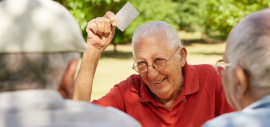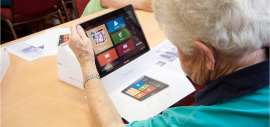Blog: The Brain Dialogues, filtered by tag: Social Activity
Dr Anne-Nicole Casey | Meet Our Researcher Series
Providing individuals and policymakers with valid information regarding the impact social relationships have on successful ageing is the ultimate hope Dr Anne-Nicole Casey has for her research. There is a wealth of evidence to suggest that maintaining positive social relationships, particularly during challenging periods like the current global pandemic, can help to support cognitive and emotional well-being. According to Dr Casey it is our family and friends that sustain us; a sentiment that would resonate strongly with the community at this time and remains applicable despite physical… Read More
Socialisation Safeguard
RHIAGH CLEARY & HEIDI DOUGLASS
Human beings are by nature social beings, and socialising is important to maintain mental, emotional and physical health.
Socialisation has been shown to boost immunity and have health benefits such as reduced osteoporosis and rheumatoid arthritis and improved cognitive function and cardiovascular health. According to researchers at the Centre for Healthy Brain Ageing (CHeBA), those who socialise regularly are more likely to live longer, healthier, and happier lives.
Rhiagh Cleary
Our research also shows that the pattern in which you socialise can… Read More
Does Social Interaction Reduce Risk of Dementia?
DR ANNE-NICOLE CASEY
How people interact with and perceive one another, and each person’s thoughts and feelings about the quality of those interactions and relationships, can affect physical and mental health and well-being. Social cognitive function, which broadly refers to the way our brain processes social information, is recognised as an important marker of how efficiently our brain processes information in general1. Interestingly, the number of individuals with whom a person interacts frequently is associated with their short-term memory capacity2. Some studies report that having larger… Read More
Turning the Wheels – Cycling Without Age
DR VIBEKE CATTS and HEIDI DOUGLASS | h.douglass@unsw.edu.au
CHeBA’s Older Australian Twins Study Co-ordinator, Dr Vibeke Catts, has joined over 13,000 Cycling Without Age volunteers world-wide in piloting purpose-built trishaws, which provide seniors the opportunity to get into the outdoors and (again) experience wind in their hair.
A generous private donation to Montefiore Randwick provided the funds to purchase a trishaw. Throughout 2018, Mr Adrian Boss from BIKEast worked alongside Montefiore’s Leisure & Lifestyle and Volunteers departments to train volunteer pilots and get the… Read More
Ageing and Technology
This article was originally published in Montefiore LIFE magazine.
In the 21st century, increases in technological advances are seen to bring a globalised world even closer. Many of Montefiore Home's residents have families scattered all over the globe and their only means of communication with them is through digital technology. However, for many elderly people these newly emerging communications tools appear to favour the younger demographic and the older generation can be left out in the cold. Luckily for them there is a new tool which has been developed specifically to reduce the… Read More
Staying Connected Online is a No Brainer
HEIDI DOUGLASS | h.douglass@unsw.edu.au
This article was originally published in Simply Connected on the Tapestry website.
Can staying connected with your friends online keep your brain young?
Research indicates that social activity, in combination with a healthy lifestyle and brain training, actually restores and improves brain function.
In many countries we are ageing at an astonishing rate. For example, in the US, the number of individuals aged 90 years and over is predicted to increase from the current 2 million to more than 8 million by 2050.
Centenarians (those that attain the age… Read More






